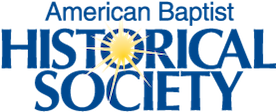Carey, William
Dates
- Creation: 1787-1832
Conditions Governing Access
The collection is open for research. Unpublished manuscripts are protected by copyright. Permission to publish, quote, or reproduce must be secured from the repository and copyright holder. Staff may refuse copying of fragile or at-risk materials.
Materials may be accessed by request at the American Baptist Historical Society. For more information on accessing collections or obtaining copies, visit http://abhsarchives.org.
Conditions Governing Use
Care must be taken, as the letters are in poor condition.
Biographical / Historical
William Carey, (born August 17, 1761, Paulerspury, Northamptonshire, England—died June 9, 1834, Frederiksnagar [now Shrirampur], India), founder of the English Baptist Missionary Society (1792), lifelong missionary to India, and educator whose mission at Shrirampur (Serampore) set the pattern for modern missionary work. He has been called the “father of Bengali prose” for his grammars, dictionaries, and translations.
A Baptist from 1783, Carey served for several years as a pastor in Moulton, Northamptonshire, where he also taught school and continued his trade as a shoemaker. In 1789 he transferred to the Baptist church at Leicester and three years later published a pamphlet titled An Enquiry into the Obligations of Christians to Use Means for the Conversion of the Heathens, which led to his forming, with a dozen other ministers, the English Baptist Missionary Society.
The society’s first missionaries, Carey and John Thomas, a doctor, went to Calcutta (Kolkata) in 1793. The following year, Carey removed himself from the society’s financial support when he became superintendent at an indigo plant in Mudnabati, Bengal. There he also preached, taught, and began his first Bible translation. Compelled to leave British Indian territory, he and his family moved to the Danish colony of Frederiksnagar, near Calcutta, in 1800. There he and Joshua Marshman and William Ward, collectively known as the “Serampore trio,” founded the mission described by the English philanthropist William Wilberforce as “one of the chief glories” of the British nation.
Appointed in 1801 to teach Bengali, Sanskrit, and Marathi at Fort William College, Carey translated the Bible into Bengali, Oriya, Marathi, Hindi, Assamese, and Sanskrit. He also translated parts of it into 29 other languages and dialects. He edited, with Marshman, a grammar in Bhotia and prepared six other grammars in different languages. In addition to dictionaries in Bengali, Sanskrit, and Marathi, Carey and Marshman prepared a translation of three volumes of the Hindu epic poem Ramayana. Having established a press at Serampore, Carey edited and published two works by horticulturist William Roxburgh, Hortus Bengalensis (1814) and Flora Indica (1832), and helped distribute prose texts for use in schools. His social work extended beyond education to urge the government to outlaw such practices as infanticide and suttee (in which Hindu widows immolated themselves on their husbands’ funeral pyres). He also encouraged the use of Indians as missionaries and led in the formation of the Agricultural Society of India in 1820.
Accessed 2019 Aug 20 from https://www.britannica.com/biography/William-Carey
Full Extent
1 Files
Language of Materials
English
General
Correspondence(some published)1787-1832; letters between Carey and John Ryland (52 Items); letter to Dr. Rogers of Philadelphia 1813; biographical data about Carey; 1 reel of microfilm
Subject
- Carey, Willilam (Person)
- Language of description
- Undetermined
- Script of description
- Code for undetermined script
Repository Details
Part of the American Baptist Historical Society Repository
3001 Mercer University Drive
Atlanta GA 30341-4115 USA
678.547.6680
678.547.6682 (Fax)
ABHSoffice@ABHSarchives.org
